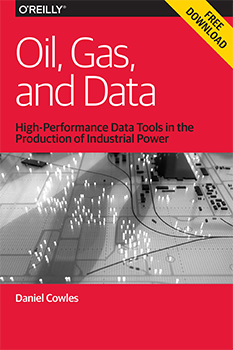Download our new free report, “Oil, Gas, and Data: High-Performance Data Tools in the Production of Industrial Power,” looking at the role of data, machine learning, and predictive analytics in oil and gas exploration.
Petroleum extraction is an industry marked by price volatility and high capital exposure in new ventures. Big data is reducing risk, not just to capital, but to workers and the environment as well, as Dan Cowles explores in the new free report Oil, Gas, and Data.At the Global Petroleum Show in Calgary, exhibiting alongside massive drill heads, chemical analysts, and the latest in valves and pipes are companies with a decidedly more virtual product: data. IBM’s Aspera, Abacus Datagraphics, Fujitsu, and Oracle’s Front Porch Digital are pitching data intake, analysis, and storage services to the oil industry, and industry stalwarts such as Halliburton, Lockheed Martin, and BP have been developing these capacities in-house.
The primary benefits of big data occur at the upstream end of petroleum production: exploration, discovery, and drilling. Better analysis of seismic and other geological data allows for drilling in more productive locations, and continual monitoring of equipment results in more uptime and better safety for both workers and environment. These marginal gains can be enough to keep an entire region competitive: the trio of cheap sensors, fast networks, and distributed computation that we’ve so often seen in other industries is the difference-maker keeping the North Sea oilfields productive in sub-$100/barrel market.
Beyond productivity (though intimately tied up with safety), is the role of data in petroleum security. While automation and monitoring can detect leaks, threats, and potential points of failure, it can also introduce a new weak point for malicious actors, such as the perpetrators of the Shamoon virus or, plausibly, non-governmental organizations like those responsible for Stuxnet.
The petroleum industry may be unique in the scale of investment that needs to be committed to a new venture ($10 million or more for a new well), but it provides a model for using data for more efficiency, safety, and security in a well-established industry. Download the full report for much more.

